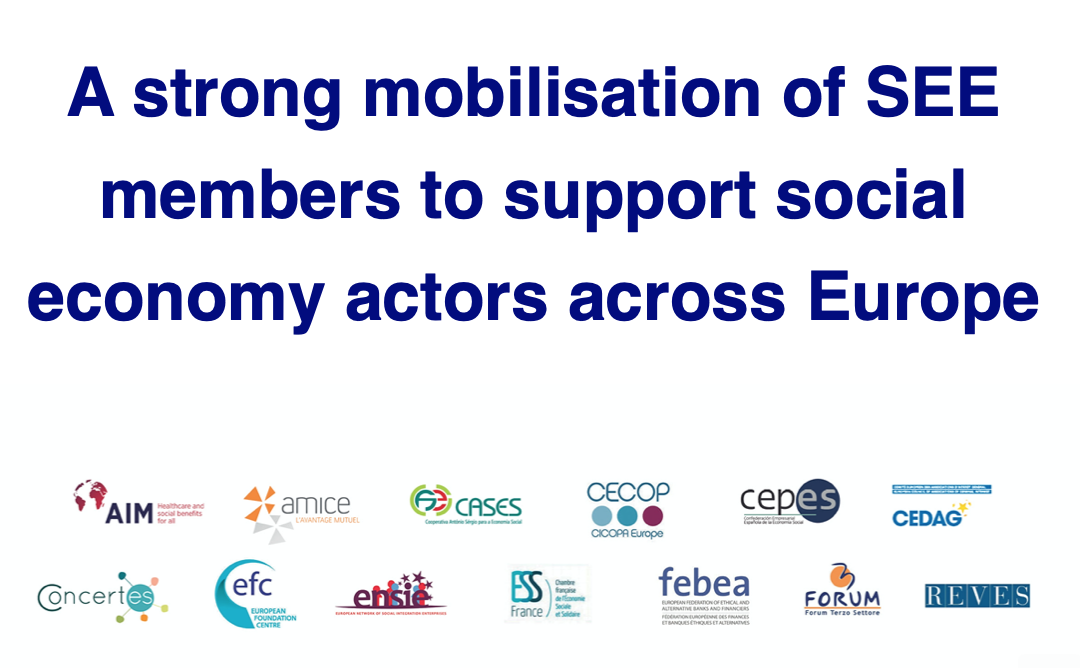From our partners: https://www.socialeconomy.eu.org
Brussels, Monday 6 April 2020,
We are facing an unprecedented crisis in Europe and worldwide with dramatic public health, economic and social consequences due to the COVID-19 pandemic.
From Social Economy Europe (SEE), as the voice of the 2.8 million social economy enterprises and organisations in the EU, we are sure that we will collectively overcome the pandemic and its economic and social consequences if we are able to take unprecedent actions guided by the values of cooperation, democracy, solidarity and responsibility, that are at the core the European Union and of the social economy enterprise and organisation models.
From a socio-economic perspective, the European Union and Member States must design measures fit for all types of economic and social players, taking into account the diverse legal forms that enterprises and organisations have across the EU, especially those pertaining to the social economy, which is an essential part of our social market economy.
We call on the EU Institutions and Member States to take into account the fundamental role of all social economy enterprises and organisations – cooperatives, mutuals, associations, foundations and social enterprises, among other organisational forms, specific to each Member State – and to support them to overcome this shock that might result in an irreparable loss for Europe.
Social economy enterprises and organisations cannot be excluded from support programmes dedicated to enterprises and specifically to SMEs. More so because the social economy is a key actor in the response to the crisis and is currently at the frontline of the battle against the potentially destructive consequences of the COVID19. The social economy is contributing by:
- Providing healthcare for all, and producing and distributing pharma products;
- Providing social services, especially for the most vulnerable in society, such as the elderly, people with disabilities, migrants and refugees, the homeless etc.;
- Producing and distributing food through agri-food social economy enterprises and social economy retailers;
- Ensuring financial and business support to the social economy and the real economy through cooperative and ethical banks and financiers, micro-credit institutions and credit unions;
- Providing insurance cover to their members/policyholders;
- Being an important industrial player present in strategic sectors, including the production of hospital devices and bio-services;
- Ensuring the provision of other basic services such as energy, water, tele-communications, cleaning, recycling etc.
Many social economy enterprises and organisations are also doing their part by promoting tele-working and implementing strategies to ensure that jobs and the economic activities are maintained throughout and after the pandemic. We are resilient enterprises and organisations, putting people and the societal objective before profit, and we will do our utmost to overcome this pandemic and be a key contributor for the economic and social recovery that Europe needs.
SEE welcomes the measures taken by the European Institutions and Member States:
Social Economy Europe welcomes the European Union’s swift reply with the adoption of the Coronavirus Response Investment Initiative that will give Member States access to €37 billion of cohesion money to strengthen healthcare systems, and support micro, small and medium-sized enterprises, short-term working schemes, and community-based services.
We support the adoption of the State aid Temporary Framework, that enables Member States to use the full flexibility foreseen under State aid rules to “ensure that sufficient liquidity remains available to all types of enterprises and to preserve the continuity of economic activity during and after the COVID-19 outbreak”.
We are please to see the decisive action of the ECB through its Pandemic Emergency Purchase Programme (PEPP), the actions of the EIB Group to guarantee access to finance for all SMEs (including most social economy enterprises and organisations), that should be further strengthened, and the activation of the General Escape Clause of the Stability and Growth Pact, giving further flexibility to Member States to deal with this unprecedent crisis.
Social Economy Europe supports the European Commission proposal of a short-time work scheme SURE, that should be accessible to all forms of enterprises and organisations.
Member States are also urgently adopting measures to ensure that enterprises and jobs can survive to the economic slowdown and pave the way to an economic and social reconstruction. We welcome these actions and the efforts of the several Member States that, together with Social Economy representative organisations, have extended and adapted these support measures to all forms of social economy enterprises and organisations. Again, we recall that all Member States should support all forms of enterprises and organisations throughout this crisis, taking into account the vast diversity of enterprise and organisational models that characterises the EU Single Market. Specific attention should be paid to Work Integration Social Enterprises (WISEs) and their workers, especially the disadvantaged individuals; as well as to “atypical workers” in cultural activities and the digital platform sector, to ensure that all workers regardless of their employment status can access to social protection and unemployment benefits.
Not-for-profit healthcare and social services providers who are confronting the public health crisis and taking care of the most vulnerable individuals, such as the elderly, people with disabilities, migrants and other collectives at risk of exclusion; should also be specifically supported by EU Institutions and Member States. Despite the crisis, the allocation of public resources committed for these strategic actors should remain untouched and even increased to address the growing healthcare and social needs.
From a public health and humanitarian perspective, we welcome the joint procurement at EU level of medical and protective equipment, as well as the joint repatriation efforts of European citizens. EU initiatives that should be further strengthened to address the current collective challenges.
The way forward- Unprecedent strategic investments in the social economy are required
We are convinced that in the coming weeks, additional urgent and extraordinary EU investments will be needed to support Member States, enterprises and organisations, workers and citizens in a situation of social or economic vulnerability throughout this disruptive outbreak. We call on the European Council to send a clear message of unity and solidarity to overcome the public health, economic and social crisis.
We call on EU Member States to contribute on the basis of solidarity to the budget of an ambitious European Economic Reconstruction Plan for this year and possibly for 2021, which has already been proposed by several Member States and welcomed by the European Commission. We should do whatever it takes to protect our economies and social cohesion, ensuring their resilience and paving the way for a sustainable recovery.
We also call on the EU Institutions to approve an ambitious Multiannual Financial Framework 2021-2027 as soon as possible, that takes into account the new socio-economic situation, and serves as powerful leverage for the economic recovery but also addresses the strategic investments that the EU needs to lead the ecological and digital transitions, especially areas such as the circular economy, and to further strengthen and modernise our welfare systems (that constitute our first defence against the effects of the pandemic).
Unprecedent investments on innovative social economy projects should be mobilised through the ESF+, the InvestEU programme and the ERDF, among other instruments and funds, particularly in strategic areas as healthcare, social innovation, digitalisation, social services, inclusion, circular economy, industry, production of renewable energies, efficiency, skills, education, agri-food, transport etc.
In the coming weeks, the EIB Group should also strengthen its investments in the enterprises and organisations that are more concerned by the economic slowdown, with special attention to Europe’s more affected regions. The access of social economy enterprises and organisation to these guaranteed investments should be ensured, and the cooperation between the EIB Group and social economy financial institutions should be further promoted. SEE is ready to cooperate with EU Institutions, the EIB and the EIF, to ensure that the offer meets the demand and that EU financial instruments are fully accessible for the social economy.
The European Action Plan for the Social Economy, that the Commission has announced for 2021, constitutes a unique opportunity to put social economy at the heart of the efforts to restore sustainable growth and social cohesion in Europe. A clear EU operational conception of what the social economy is and of its specific features and concrete needs will be required. The participation of social economy employers in the European cross-industry social dialogue should be promoted.
The COVID-19 pandemic reminds us that we are confronted with global challenges that we are unable to tackle on an individual basis: collective solutions are required. We will only overcome this crisis in an effective way with more cooperation and solidarity, values that are at the basis of the success of the social economy, and that are more needed than ever to ensure a future of economic and social progress for all Europeans.
Juan Antonio Pedreño,
President of Social Economy Europe
Annex SEE open letter to EU leaders- Time for Solidarity and Investments


